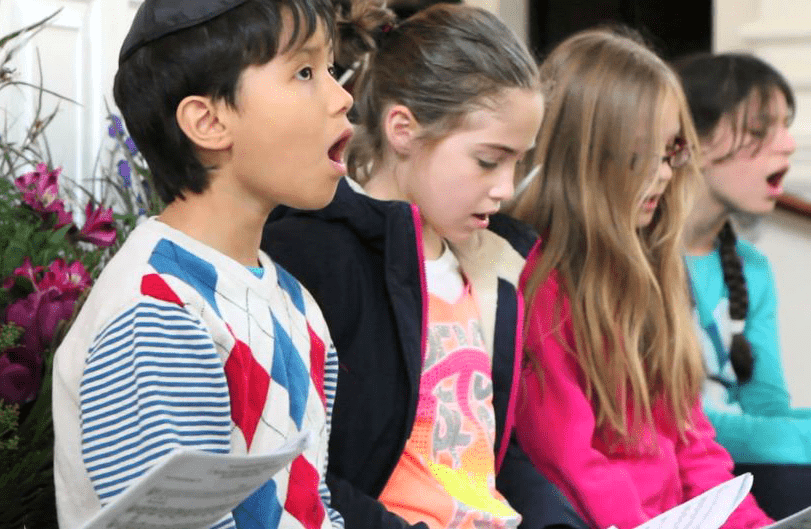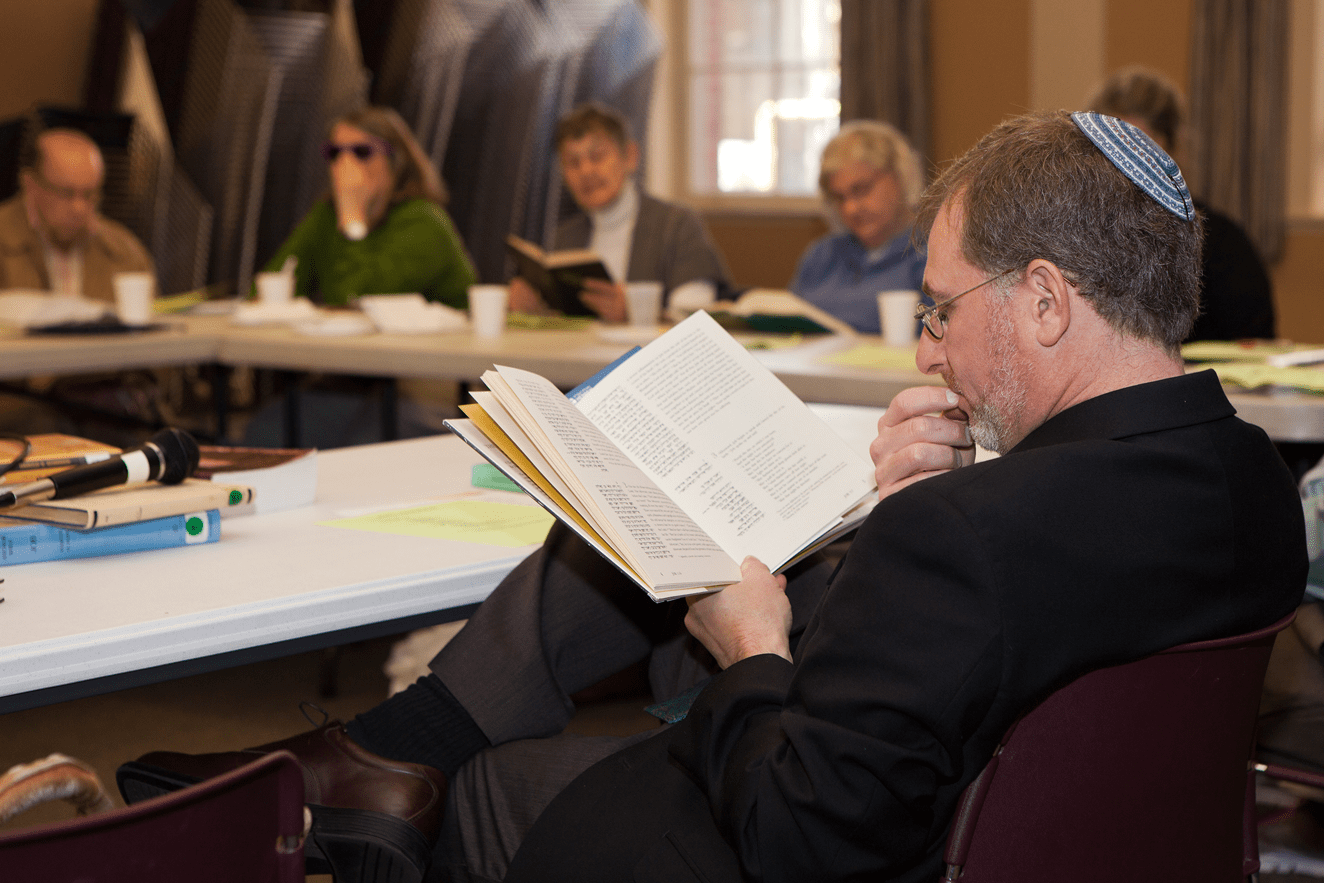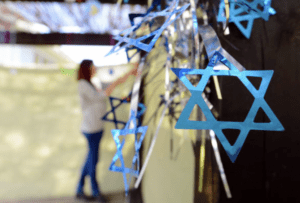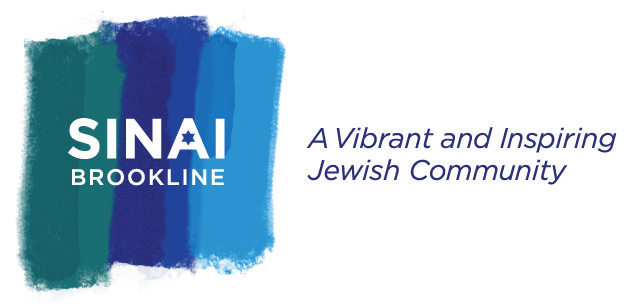Lifecycle Events


The occasions that we refer to as “Lifecycle Events” mark those moments in our lives when we (or a friend or loved one) move into a new phase of Jewish living. B’nai Mitzvah and Weddings are among the most recognized but there are other milestones and transitions as well, including the adoption or birth of a child, death of a loved one, and anniversaries of important events.
The Sinai community celebrates or marks these occasions along with our members. Some events call for more formal ceremonies, including B’nai Mitzvah and Weddings, but there are other ways to mark important occasions, including participating in a worship service or sponsoring oneg refreshments. Please feel free to talk with Rabbi Vogel about your own transitions, and how Temple Sinai can support and celebrate with you.
B'nai Mitzvah
The Temple Sinai Approach
At Temple Sinai, we envision the B’nai Mitzvah process as an entry point for our young people approaching age 13 to learn and to explore how their identity as Jews will take shape as they emerge into adulthood.
Our religious tradition has created this ritual so that the experience of transitioning into adolescence is done within a nurturing Jewish context.
Our approach is to give teens foundational, lifelong skills toward becoming an adult Jew. We see B’nai Mitzvah as a gateway to adulthood, and as our teens pass through this portal, they have opportunities to try out new ideas, new behaviors of responsibility, and new skills that will lead them to a firm Jewish identity.
As teens pass through this gateway, they try on the mitzvot, the commandments of Jewish tradition that all adults aspire to study and perform.
Our B’nai Mitzvah students are encouraged to study Torah and interpret it in a D’var Torah they will present to the congregation. By building their life-long synagogue skills, students learn the structure of a Shabbat morning service so they may walk into nearly any synagogue in the world and be comfortable knowing “where they are” in the service.
Students lead parts of the prayer service as well as the Torah service so they may experience the important commonality and spirituality of prayer and Torah. Our students are expected to be involved in a personally chosen project of social justice or Tikkun Olam, repairing the world.
Our “Exploring Mitzvot” curriculum provides a structured guide to study of the wide array of mitzvot including ethical, ritual, and study commandments. In these ways, becoming a B’nai Mitzvah is preparation for life-long Jewish involvement and meaning. While the B’nai Mitzvah ceremony may be the culmination of years of preparation, it is really the beginning of a lifetime journey.
For more information about B’nai Mitzvah at Temple Sinai, please contact Education Director Jen Zak or Rabbi Andrew Vogel.
A Note on Gender Pronouns and Terms
We are aware that some students identify as non-binary gender and are committed to affirming students’ gender identities, especially during a very important public life cycle moment. We recognize, in the words of Keshet, that “the traditional language and practices associated with a Bar or Bat Mitzvah can exclude people who are non-binary, agender, gender fluid, gender-queer, or any gender identity that is not girl or boy.” We see Jewish tradition as continually developing and growing to meet the evolving needs of Jews in every age and era, and we are proud to grow as a community to meet the needs of non-binary gendered students. With those needs in mind, Temple Sinai offers our students and their families the option of calling their ceremony that marks the entry into adolescence any of the following terms, according to their needs: Bar Mitzvah (for a child who identifies as a boy), Bat Mitzvah (for a child who identifies as a girl), B’ Mitzvah (pronounced “Bee Mitzvah”) or B’nai Mitzvah (for a child who identifies as non-gender binary). Our rabbis welcome the opportunity to discuss questions around gender identity with our students and their families, including what term or terms are most appropriate for this ceremony, and want each child to be fully seen and understood for the specific ways they may navigate the world.
Download Temple Sinai’s B’nai Mitzvah Handbook for Parents.
Aliyot Blessings
We encourage parents and other family members to learn these Aliyot blessings, which are recited before and after each section of Torah is read on a Saturday morning. At Temple Sinai, we ritually mark the moment of “becoming a B’nai Mitzvah” when children are publicly called to the Torah by their Jewish sacred name (Hebrew or Yiddish) and then recite these blessings. Before that moment, parents and other family member receive the honor of reciting these blessings, as well.
Weddings
Mazel Tov!
A Jewish wedding is a beautiful ceremony between two individuals entering into a holy covenant with one another. It echoes the covenant (brit) that the Jews entered into with God at Mount Sinai. Through various traditional Jewish wedding rituals, most especially through the ketubah (marriage contract) and the exchange of rings, two people begin a new relationship with one another, accepting special obligations toward one another in love.
The wedding ceremony is called “Kiddushin,” a term for holiness, which indicates that two people joined in marriage share a relationship that is sanctified, set-apart, and touched by God. The wedding ceremony occurs under a wedding canopy, called a chupah, which symbolizes the Jewish home.
A special blessing invokes the idea that God is present even in the most intimate of our relationships. The traditional Seven Blessings (Sheva Brachot), which are often sung, recall how the city of Jerusalem rejoices whenever a Jewish wedding occurs.
Temple Sinai’s rabbis welcome all Jewish and Jewish-adjacent (Jewish+) couples, including LGBTQ+ couples and interfaith couples, to discuss with us whether and how to create a meaningful and beautiful marriage or partnership ceremony will fit your vision for your shared life together.
Individuals interested in learning more about a Jewish wedding should contact Rabbi Vogel or Rabbi Stein. We also recommend you explore these excellent resources:
Books:
The Jewish Wedding Now by Anita Diamant
Meeting at the Well: A Jewish Spiritual Guide to Being Engaged by Rabbis Daniel Judson and Nancy H. Wiener
The Guide to Jewish Interfaith Family Life, edited by Ronnie Friedland and Edmund Case
Websites: https://18doors.org (previously InterfaithFamily)
Conversion
By Rabbi Andy Vogel
As a rabbi, one of my greatest joys is working with people who are setting out on the journey of choosing to become Jewish.
Conversion to Judaism is a wonderful, transformative experience. Each individual is embarking on a personal and unique journey of exploration. Each one studying to convert to Judaism is discovering their own relationship with God, exploring their relationship to the Jewish people and Jewish history, and taking on Jewish practices and ethical teachings in their own way.
The process of converting to Judaism is private and personal as well as amazingly powerful and meaningful. Every individual has a different and personal reason to consider becoming Jewish. Some are involved in a relationship with a Jew and want to share Judaism with their partner. Others are on a spiritual search, having had a meaningful encounter with Jewish ideas and practices. Some have been living in a Jewish family for years, lighting Shabbat candles and making Passover Seders, when they discover that they want to become Jewish.
Whatever the reason for entering the process, the journey unfolds in new and unexpected ways for each person.
Conversion is a unique and personal experience. I meet regularly and privately with each conversion student for about one year. Conversion includes study and reflection about Jewish theology, identity and relationships, history, prayer, community, personal practice, spirituality, Israel, holidays, and God.
I urge all students to participate in one of the Union for Reform Judaism’s “Introduction to Judaism” courses, a rich path of Jewish learning as well as a way to develop community with others who share a common journey.
After the study and preparation are complete, we participate in a holy, deeply spiritual, and beautiful moment at the mikveh (the Mayyim Hayyim ritual bath in West Newton) when the convert immerses in a pool of water, symbolizing the womb, a ritual spiritual re-birth.
Once a person has immersed and emerged from the waters, they are considered fully Jewish. Hearing the three splashes of water and the convert reciting the blessings from the other side of the door at the mikveh, I am always moved knowing that a new person is entering the Jewish community.
And then… we celebrate! Family members rejoice, and we pronounce the new Hebrew name the convert has chosen. Later, our congregation will welcome them to the Jewish community during a Shabbat service, as they step forward to the Bimah in our sanctuary, stand before the Ark, and recite the Shema.
They embrace the Torah, accept Judaism as their religion and the Jewish people as their people publicly. This is a sweet, happy, and holy moment for the individual and for the whole community.
Our entire community is strengthened by having so many people who have chosen to become Jewish. We embrace all of them. I want to extend an invitation to anyone who is ready to take the first steps on this meaningful journey. It will be my honor and blessing to stand with you each step of the way, as you join our community and people, through this rich, unfolding, and holy experience of discovery.
We welcome you to Sinai Brookline even if conversion is not the right choice for you or not the right choice right now. The Jewish adjacent (also known as Jewish+) are an important part of our community which strives to be diverse and inclusive. We respect and appreciate the richness you bring.
If you want to convert to Judaism:
Step 1 – Call or email Rabbi Vogel at Temple Sinai to make a first appointment.
Step 2 – Enroll in the Reform movement’s 16-week “Introduction to Judaism” class, offered 4-5 times per year by a variety of Reform synagogues around the Boston area. You can learn about the class, see the schedule of “Intro” classes offered, register, and pay by clicking here: https://ReformJudaism.org/Intro/MA.
Step 3 – As your first assignment, read Anita Diamant’s wonderful book, Choosing a Jewish Life: A Handbook for People Converting to Judaism and for Their Family and Friends (be sure you obtain the updated 2016 version).
Step 4 – Consider joining us at Temple Sinai to attend Shabbat services on a Friday night, where you’ll meet members of our congregation, including other people who are in the process of converting to Judaism. Our services are always open to the entire community, and we look forward to welcoming you!
Membership: Once you formally convert to Judaism you may officially join Temple Sinai. During your conversion process, we welcome you to attend all classes, Shabbat services, social justice actions, and other activities in our congregation. Our By-Laws allow people who are Jewish, or who are a member of a household that includes someone Jewish, to become Temple members and make their contribution to the congregation through a SinaiPromise dues pledge.

Food Policy at Sinai Brookline
“You are free to eat from any tree in the garden; but you must not eat from the tree of the knowledge of good and evil, for when you eat from it you will certainly die.” Genesis 2:16-17
We are committed to the ongoing study of the whole array of mitzvot and to the fulfillment of those that address us as individuals and as a community. Some of these mitzvot, sacred obligations, have long been observed by Reform Jews; others, both ancient and modern, demand renewed attention as the result of the unique context of our own times. From the 1999 CCAR Statement of Principles
The question of what we should and should not eat has been with us since the Garden of Eden. As Reform Jews, we recognize wide personal autonomy in the making decisions about our eating practices and we seek to have those decisions informed by a lifelong engagement with Judaism. Through study, listening to others, and consulting our own beliefs, we define our own practices as we affirm that there are many paths toward spiritual meaning in our interactions with food.
In crafting a policy for dietary practice at Temple Sinai, we are aware of the diversity of opinion and practice. The Food Policy subcommittee of the Music, Prayer, Ritual (MPR) committee engaged in over a year of small group study about the many approaches to these issues within the Reform Movement. We have engaged the congregation through meetings, presentations at Shabbat services and elsewhere, and by inviting Rabbi Mary Zamore to speak on the topic as our Cohon Lecturer in 2013. The MPR Committee discussed an earlier draft of this document in meetings in the spring of 2014 and over email.
Our core consensus is that it should be possible for almost everyone to eat a reasonable meal when we serve a meal at Sinai. In saying this, we seek to be as welcoming and accommodating as possible as we seek to respect the choices of our members and guests while using the synagogue as a setting in which to encourage informed Jewish thought about those choices.
We propose:
- That Temple policy exclude traditionally non-kosher meats (pork and shellfish).
- That meat and dairy be kept separate, but that both be permitted at the same meal but not in the same dish.
- That all dishes be labeled in a manner that allows guests at our meals to make informed and healthy choices. For example, choices could be made about gluten, nuts, kosher vs non-kosher meat, milk vs nondairy creamer.
- We support ethical treatment of animals and concern for the welfare of those who grow our food and we would urge congregants to keep these concerns in mind when purchasing food for Temple (or, indeed, any) events.
To elaborate a bit:
- In saying that almost everyone should be able to dine with us, we acknowledge that we may not be able to accommodate someone who is practicing any strictly halachic form of kashrut.
- We might have trouble accommodating a strictly vegan diet.
- Similarly, we might not be able to satisfy people with objections to what other people were eating at the same meal (e.g. a strict vegetarian who was not comfortable at any meal including meat or an individual who was not comfortable with meat and dairy being present at the same meal even if they were not combined.)
- By “a reasonable meal”, we mean that everyone who comes to eat with us should be able to have a main course, side(s), and dessert without violating their core principles.
- We expect this policy to govern temple events (e.g. Communal Shabbat dinners) and we hope that the same principles would govern other events at Temple (e.g. B’nai Mitzvah receptions).
In the end, we want meals at Sinai
- to be as welcoming as possible
- to be as sensitive as possible to the needs of all
- to reflect our Reform Jewish principles as well as our ties to the Jewish community
- to reflect our commitment to social justice and tikkun olam
